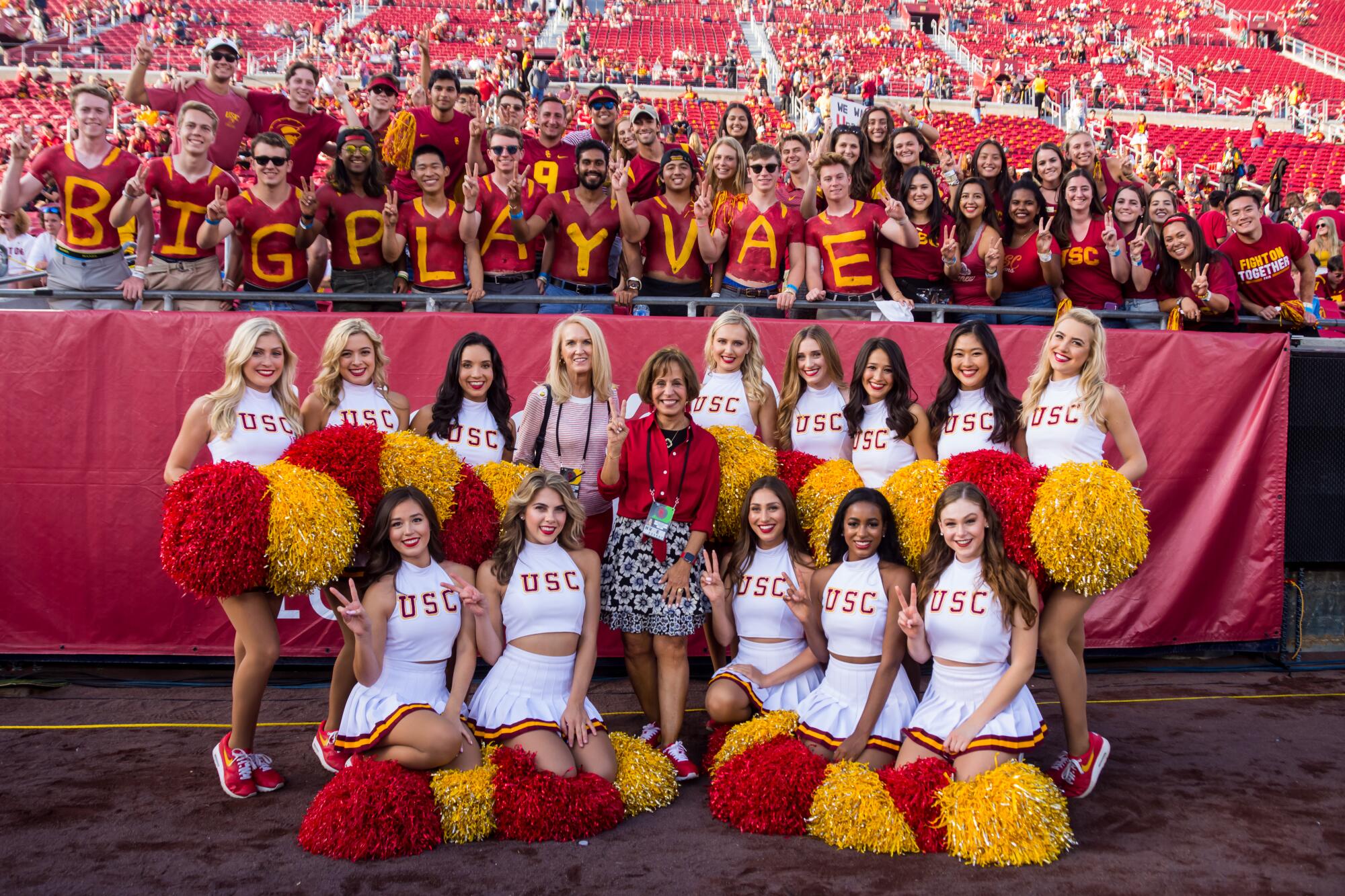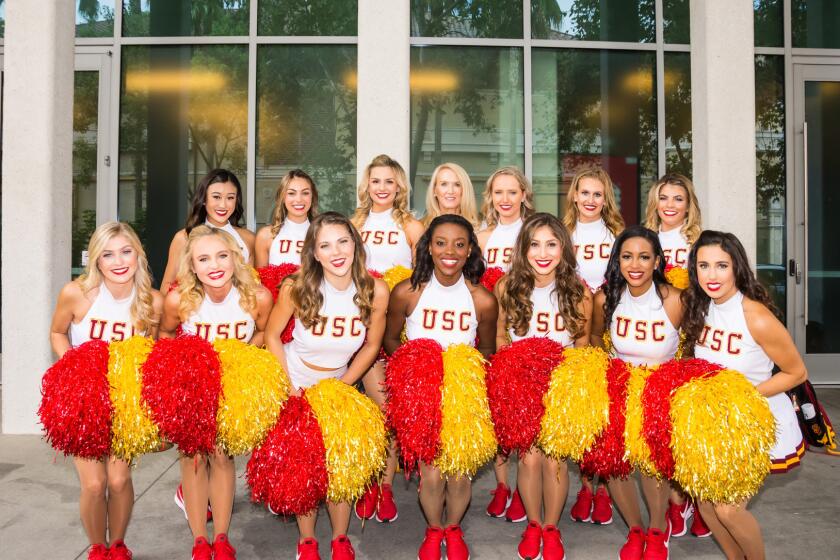
The USC Song Girls program and longtime coach Lori Nelson were the subject of a 2016 Title IX investigation, which turned up insufficient evidence Nelson violated university policies.
The decision was handed down five years before USC’s current inquiry into discrimination, harassment and retaliation within the Song Girls program, The Times has learned.
The inquiry, which has not been previously reported, centered on a complaint from one Song Girl who presented text messages and recounted her negative experiences within the famed collegiate dance squad.

“Based on the witness statements and information available, there was insufficient evidence to conclude that Ms. Nelson’s conduct on this one occasion rose to the level of sexual harassment in violation of university policy,” senior complaint investigator Karen Carr wrote in a letter reviewed by The Times. “Additionally, there was insufficient evidence that Ms. Nelson sent the February text message in retaliation for your sexual harassment complaint.”
Carr added that she found Nelson’s comments in a series of text messages to a Song Girl to be “unprofessional and inappropriate.”
“This matter will be referred to human resources for that department’s review and handling as deemed appropriate,” she wrote.
USC declined to state whether Nelson faced any university discipline after the 2016 investigation. Two members of the 2016 Song Girls team, including the woman who prompted that 2016 Title IX complaint, told The Times their relationship with the coach deteriorated after the inquiry. Both left the team before the year was up. One says she dealt with depression and eating disorders she attributed to her time on the team.
USC officials declined to comment on the 2016 investigation, but they reiterated a previous statement to The Times stating the university is aware of concerns raised by current and former Song Girls and is addressing them.
The 2016 Title IX probe is an indication the university has fielded concerns about the program long before the pending case.
Ten former USC Song Girls described to The Times a toxic culture within the famed collegiate dance team that included longtime former coach Lori Nelson rebuking women publicly for their eating habits, personal appearance and sex lives.
Nelson’s attorney, Ryan Saba, released a statement defending her efforts leading the Song Girls program for more than 30 years.
“In 2016, one former Song Girl made a complaint to USC. In response to that complaint, USC conducted an internal investigation,” the statement read. “The complaining party was considered an outlier Song Girl who was rude, disrespectful and disruptive at practice after she suffered an injury. After a thorough investigation, and interviews of witnesses, USC’s Office of Equity and Diversity and human resources department did not find that Ms. Nelson violated any university policy in her treatment of this Song Girl. Ms. Nelson was not disciplined, nor should she have been. Ms. Nelson never discriminated or harassed any Song Girl in her entire tenure.”
The allegations made during the 2016 investigation are similar to those made by the former Song Girls who came forward to USC officials last year and spoke with The Times about harassment that included Nelson rebuking women publicly for their eating habits, personal appearance and sex lives.
Their Title IX investigation, which has spanned nine months, is expected to conclude soon after investigators conduct follow-up interviews with witnesses.
Nelson, who resigned in early November, denied Song Girls allegations through her attorney in April. USC stated it is “deeply concerned when any student experiences emotional or mental health challenges or other barriers to our educational programs and activities.”
Former Song Girls coach Lori Nelson
Carly Duncan said she was among the women on the 2015-16 team who struggled with a culture of body shaming and eating disorders. In 2016, Duncan says she fell into a deep depression and struggled to get out of bed.
“That was the worst period of my life,” said Duncan, who decided not to participate in the 2016 Title IX investigation because of fear of retaliation from Nelson.
The texts at the center of the 2016 Title IX inquiry were sent on the morning of Jan. 29, 2016, in response to a photo posted to a private Instagram account. In the photo, four female USC students, three of them Song Girls, are posing in a hallway in heels and club attire.
Within a few hours of posting, the former Song Girl said Nelson texted the group and demanded the Instagram photo be taken down.
“If I didn’t know you girls personally … I would never think you were USC Song Girls,” Nelson wrote, according to a screenshot of text messages reviewed by The Times. Images of the messages have been shared widely among past Song Girl members. Two former Song Girls and one parent told The Times they saw the messages the day they were received.
The second-year Song Girl agreed to take the photo down, but Nelson suggested the photo had been forwarded to her all morning by past Song Girls.
“You do not want to see their comments,” Nelson wrote in a sequence of text messages.
“‘Hooker, Ho, and Slut Party?’”
“‘My jaw is on the floor Lori, PLEASE tell me these three are no longer on the team.’”
The Song Girl told Nelson she was offended a former member of the program would make such comments. Nelson responded that she should “take accountability.”
“If you don’t want that reaction then use better judgment,” she continued.
The woman’s relationship with Nelson deteriorated after that encounter, their distrust growing even deeper when she received a text from Nelson five days later.
The coach’s message, which seemed to be intended for someone else, called her “a complete nightmare.”
Former USC Song Girls coach Lori Nelson blamed the university for the toxic environment within the famed spirit squad, which is the subject of a Title IX investigation, in her resignation letter.
Days later, the woman’s mother emailed a complaint letter and copied Nelson, along with two other administrators in student affairs. In the letter, a copy of which was shared with The Times, she alleges “a pattern of harassing conduct by Ms. Nelson,” in which she “frequently criticized the girls for their weight” and routinely told them to “stay extremely thin.”
Saba, Nelson’s attorney, did not directly address the incident when contacted by The Times. Instead, he more broadly defended Nelson’s efforts leading the Song Girls program.
“Ms. Nelson vehemently denies that she mistreated any Song Girl,” Saba said. “Instead, she should be applauded and hailed for leading the Song Girl program at USC to national prominence. The Song Girls are as integral as the athletic participates in the fabric of NCAA sports experiences. The complaints of a handful of disgruntled and subpar Song Girls does not justify tarnishing the tremendous reputation of the hundreds of Song Girls who participated and represented USC in a proud manner. Any suggestion that USC or Ms. Nelson did anything wrong is a fantasy.”
USC told The Times the Song Girls no longer must comply with weight restrictions, which former dancers told The Times contributed to the eating disorders and body image issues among team members.
Duncan often received the brunt of criticism, two former Song Girls told The Times.
Song Girl members were selected by a panel of judges that receives recommendations and background information from Nelson, according to former Song Girls and a copy of the agreement team members sign.
“The complaints of a handful of disgruntled and subpar Song Girls does not justify tarnishing the tremendous reputation of the hundreds of Song Girls who participated and represented USC in a proud manner.”
— Lori Nelson’s attorney Ryan Saba
Shortly after she made the squad for a second year, Duncan said she was called into Nelson’s office for a private meeting. The coach put her hand on her knee, Duncan recalled, before attempting to persuade her to quit the Song Girls.
“She just kept saying, ‘I know you don’t have the money to buy [Lululemon leggings],’” Duncan recalled. “‘I know this is hard for you. You can’t give the mental energy the other girls can because you want to be a doctor.’ She talked about how I look average compared to the other girls because I don’t have the money to buy makeup and hair stuff. Then she was like — I remember she said, ‘I don’t know whose bed you wake up in in the mornings.’’’
Upset, Duncan pushed back: “Is that something I can tell your supervisor that you said?” she recalled saying.
A teammate said Duncan told her about the encounter and the teammate’s mother noted it in a February 2016 letter that initiated a Title IX complaint.
Nelson’s attorney did not address questions about the conversation provided by The Times.
Unable to practice because of an injury, Duncan said she left the team that spring at Nelson’s suggestion. The Song Girl on the receiving end of Nelson’s texts followed soon after, quitting before the end of football season. Both tried to put their experiences with the Song Girls behind them.
But two years later, as the program prepared to celebrate its 50th anniversary, Duncan realized she hadn’t received an invitation.

She reached out to USC in search of answers, only to have an official in student affairs confirm what she suspected. She’d been banned from the Song Girls reunion.
In his email response, which was reviewed by The Times, Mike Munson, USC’s associate director of student affairs, forwarded Duncan a message from the “Song Girl Homecoming Committee,” which suggested she “abandoned the program and made disparaging comments against the program.”
“After deliberation,” the message read, “we have made a judgment and regret to inform you that we will not be inviting you to participate in the 50th Anniversary Song Girl reunion.”
Duncan was stunned. She tried to explain herself to Munson, who deferred to the committee’s decision.
“I do not have the details,” he wrote.
Munson did not respond to The Times’ requests for comment.
Two years after his email correspondence with Duncan, USC launched another Title IX investigation into the Song Girls program.
More to Read
Go beyond the scoreboard
Get the latest on L.A.'s teams in the daily Sports Report newsletter.
You may occasionally receive promotional content from the Los Angeles Times.








